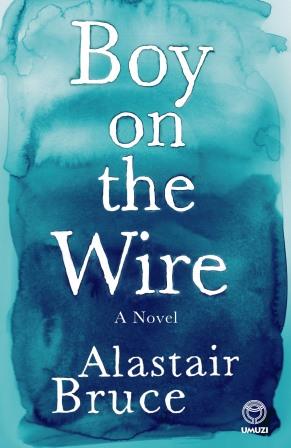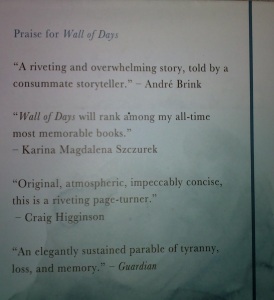 The first one arrived in manuscript form for evaluation. I started reading it in bed in the morning and nearly didn’t get up until I was finished. The exhilaration of the encounter is still with me years later. I thought I was reading one of South Africa’s greats. Galgut or Coetzee came to mind – not a debut novelist.
The first one arrived in manuscript form for evaluation. I started reading it in bed in the morning and nearly didn’t get up until I was finished. The exhilaration of the encounter is still with me years later. I thought I was reading one of South Africa’s greats. Galgut or Coetzee came to mind – not a debut novelist.
My reader’s report glowed with praise. The novel was eventually published as Wall of Days (2010), locally and abroad, also in translation. The author turned out to be a young man from PE who moved to the UK. Last year, Alastair Bruce published his second novel, Boy on the Wire, and it is just as haunting as his first.
In the Prologue of Boy on the Wire, John Hyde walks cautiously through his childhood home in Port Elizabeth. In one of the rooms, he sees a man, “or he imagines he can see the man … He knows, too, he cannot touch him, cannot touch the lying man. If he even touched the tip of his fingers to the man’s forehead, it would all be over.” Nothing is “clear”. What is real, what is imagined? Everything hinges on the distinction. The confrontation with the “man who lied, who told the story, a wild, fanciful story, about the death of a child, a hard and unyielding story” is what the novel is about.
 The narrative takes us back to a Sunday in the December of 1983 when John, his brothers Paul and Peter, and their parents travel to the mountains in the Karoo for a family holiday. But only four of them return home. And there are no real survivors. The tragedy literally plunges them all into an abyss.
The narrative takes us back to a Sunday in the December of 1983 when John, his brothers Paul and Peter, and their parents travel to the mountains in the Karoo for a family holiday. But only four of them return home. And there are no real survivors. The tragedy literally plunges them all into an abyss.
Trauma disrupts time, memory and narrative. Storytelling can be one of the most efficient mechanisms of attempting to deal with it. In order to cope with the death of one his brothers, John tells a story. But his version of the events leading up to the tragedy has severe consequences for the family: “The death of a child – there’s no coming back from that.”
We encounter John again in his thirties. In his early twenties, he’d left his family and South Africa behind, making a clean break and emigrating. Alienated from his past, and from himself, he marries Rachel and makes a successful living in London. But one day he sees a figure outside his window which draws the illusions of his past into the fragile reality he has built around him, and he is forced to return to South Africa to confront the mystery of that fatal December day in the Karoo. But as Rachel will realise: “If you examine a mystery closely enough, for long enough, certainty will follow. Certainty, but not necessarily truth.”
Boy, Bruce can write! It is austere writing, but not without a certain lyricism. No words go amiss, all hit the target. At times, the narrative tension becomes relentless, even to a point of frustration. Bruce is a master of creating smokescreens for his readers. In both, Wall of Days and Boy on the Wire, you are never sure what the real story is, or who in the story is real or imagined. The beauty of his novels lies in the intriguing mind games – it is impossible not to want to know what happened. But Boy on the Wire is not a light, entertaining read. The novel is emotionally exhausting. It creeps under your skin.
 Whereas Wall of Days was as close to perfection as a novel can get, I had some difficulties with the characterisations in Boy on the Wire. The portrayal of John and Rachel’s relationship after his return to South Africa wasn’t convincing enough for me. I could not relate to Rachel’s responses to the unfolding of the events and found the explanations of her behaviour implausible in a few moments. Furthermore, I am not sure that readers who are unaware of the effects of trauma on the mind will find enough narrative guidance in the story to read John’s mental states as plausible. I also found my suspension of disbelief tested when it came to the simple day to day logistics of inhabiting an inherited house.
Whereas Wall of Days was as close to perfection as a novel can get, I had some difficulties with the characterisations in Boy on the Wire. The portrayal of John and Rachel’s relationship after his return to South Africa wasn’t convincing enough for me. I could not relate to Rachel’s responses to the unfolding of the events and found the explanations of her behaviour implausible in a few moments. Furthermore, I am not sure that readers who are unaware of the effects of trauma on the mind will find enough narrative guidance in the story to read John’s mental states as plausible. I also found my suspension of disbelief tested when it came to the simple day to day logistics of inhabiting an inherited house.
Despite these reservations, which took very little away from the impressive impact Boy on the Wire had made on me, I can’t wait to see what Alastair Bruce will do next. Without any doubt, he is on his way to becoming one of our greats.
Boy on the Wire
Umuzi, 2015
Great review, and while you found criticism, I think I will go and take a sneaky peak at it
Please do let me know what you thought of it.
Pingback: Karina M Szczurek reviews Boy on the Wire by Alastair Bruce | Books LIVE